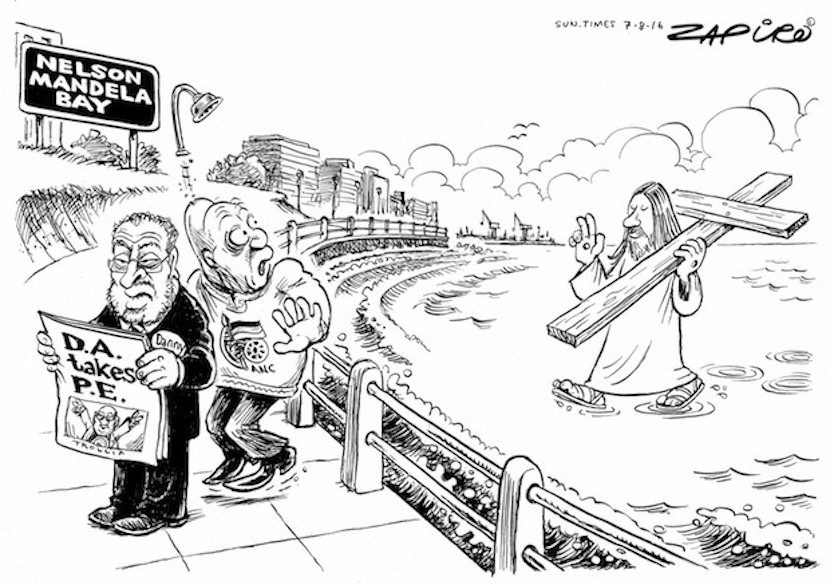
Like many other South Africans, I got caught up in the excitement as the results trickled through after last week’s 2016 municipal elections. And like many, I was confused by the complexities of how the country’s unique electoral system works – specifically the intricacies of its proportional representation system. UCT professor, constitutional expert and fluid blogger Pierre de Vos provides the ideal antidote for such ignorance. The superb article below republished with permission from his Constitutionally Speaking blog answers those questions South Africans will be asking as their country enters a new era of competitive politics – with coalitions at 27 of its metros and municipalities. – Alec Hogg
By Pierre de Vos*
What happens once the votes are cast and all the ballots are counted in the 2016 local government election? Is the party who obtained the largest number of seats in a council legally entitled to elect its candidate as mayor – even if that party did not win an outright majority of seats on the council? And how will coalitions work? In what follows I attempt to answer these questions.

Question: How will seats be allocated in each municipality?
In an election for a metro council, or for a local council that has wards (which I will focus on), each voter has two votes. This means most voters in a local government election will fill in two ballots – one for a ward candidate (who may be a member of a political party or an independent) and one for a political party list.
The ward candidate who obtains the most votes in that ward (even if this is not an absolute majority of votes cast in the ward) gets elected to the municipal council as a ward councillor. Ward councillors comprise 50% of the total number of seats in a municipal council with this system. The list candidates comprise the other 50%, but the list seats are used to “top up” a party’s seats to ensure proportional representation for each party in a municipal council.
Read also: Remembering Anton Rupert’s wisdom as post-election horse-trading kicks off
This is done as follows. The total number of votes cast for each political party in the ward election and the party list election are added together to determine the proportion of the council seats to be held by each political party in a municipality.
To ensure that each political party is proportionally represented in each municipal council, candidates from political party lists are allocated to council in proportion to the total percentage of the votes cast for that municipal council to ensure that the ward seats and the list seats – added together – represent the proportional vote that the political party obtained in the election.
A party who wins a disproportionate number of ward seats will therefore be allocated far fewer list seats than a party who won a disproportionately low number of ward seats. The formula to determine the exact number of seats for each party is rather complicated, but to simplify somewhat, in the end each party will have more or less the proportion of seats in the municipal council equal to the percentage of the total votes cast for them (in the two ballots) in that municipal council election.
So, for example, if a party received a combined 60% of the total number of votes cast for their ward candidates and for their party list, they will end up with more or less 60% of the seats on the municipal council – even if the party won 80% of the ward seats in the elections.
| SA COUNCILS WHERE NO PARTY HAS MAJORITY | |||||||
|---|---|---|---|---|---|---|---|
| Seats for majority | ANC | DA | EFF | Others | |||
| Johannesburg | 136 | 121 | 104 | 30 | 15 | ||
| Ekurhuleni (Gauteng) | 112 | 109 | 77 | 25 | 13 | ||
| Tshwane (Gauteng) | 107 | 89 | 93 | 25 | 7 | ||
| Nelson Mandela Bay (E Cape) | 60 | 50 | 57 | 6 | 7 | ||
| Mogale City (Gauteng) | 39 | 38 | 27 | 9 | 3 | ||
| Rustenburg (North West) | 45 | 43 | 14 | 24 | 8 | ||
| Thabazimbi (Limpopo) | 12 | 10 | 5 | 5 | 3 | ||
| Modimolle/Waterberg (Limpopo) | 15 | 13 | 7 | 6 | 2 | ||
| Metsimaholo/Sasolburg (Free State) | 22 | 19 | 12 | 8 | 3 | ||
| Jozini (KZN) | 21 | 19 | 1 | 1 | 19 | ||
| Mtubatuba (KZN) | 21 | 18 | 2 | 1 | 19 | ||
| Nqutu (KZN) | 17 | 14 | 1 | 1 | 17 | ||
| eDumbe/Paulpietersburg (KZN) | 9 | 8 | 5 | 0 | 3 | ||
| Endumeni/Dannhauser (KZN) | 7 | 6 | 2 | 1 | 4 | ||
| Estcourt (KZN) | 24 | 23 | 2 | 1 | 20 | ||
| Abaqulusi/Vryheid (KZN) | 23 | 21 | 3 | 1 | 19 | ||
| Nama Khoi/Springbok (N Cape) | 9 | 8 | 7 | 0 | 2 | ||
| Ubuntu/Victoria West (N Cape) | 4 | 3 | 2 | 0 | 2 | ||
| Kgatelopele/Danielskuil (N Cape) | 4 | 3 | 2 | 0 | 2 | ||
| Witzenberg/Ceres, Tulbagh (W Cape) | 12 | 8 | 11 | 1 | 3 | ||
| Laingsburg (W Cape) | 4 | 3 | 3 | 0 | 1 | ||
| Prince Albert (W Cape) | 4 | 2 | 3 | 0 | 2 | ||
| Beaufort West (W Cape) | 7 | 6 | 6 | 0 | 1 | ||
| Knysna (W Cape) | 12 | 7 | 10 | 0 | 4 | ||
| Hessequa/Heidelberg (W Cape) | 9 | 8 | 8 | 0 | 1 | ||
| Kannaland/Ladismith (W Cape) | 4 | 2 | 2 | 0 | 3 | ||
| Bitou/Plettenberg Bay (W Cape) | 7 | 6 | 6 | 0 | 1 |
Question: What happens after the final election results are declared?
In terms of the Local Government Municipal Systems Act, a municipal council must meet within 14 days after the municipal council’s election (that is, the day the IEC declares the final results) and at this meeting the first order of business will be the election of a speaker from among its members.
The municipal manager of the municipality or, if the municipal manager is not available, a person designated by the MEC for local government in the province, will preside over the election of a speaker. After the election of the speaker, he or she presides over other internal elections.
If no candidate receives a majority of the votes (which may occur if no party holds at least 50% of the seats in a municipal council), the candidate who receives the lowest number of votes must be eliminated and a further vote must be taken on the remaining candidates. This procedure must be repeated until a candidate receives an absolute majority of the votes.
A municipal council by resolution may remove its speaker from office with the support of a simple majority of council members. This might occur if the balance of power in a council shifts because a coalition government collapses. However prior notice of an intention to move a motion for the removal of the speaker must be given.
Municipalities can be organised in terms of an executive committee system in which each party is proportionally represented in the executive committee. However, few municipalities, if any (I do not have the statistics at hand), have opted for this system which in essence requires power-sharing between political parties.
Instead, most municipalities have opted for the executive mayor system. In this system, once the speaker is elected (but this must happen within 14 days after the final determination of the election results), the members of the council must elect an executive mayor in the same manner than it elected a speaker.
This means a municipal council must elect an executive mayor with 50% plus one of the votes in the council. The executive mayor can also be removed from office in the same manner as the speaker.
But what happens if no candidate for speaker or executive mayor obtains a majority of votes? If the remaining two candidates who have received the most votes in previous rounds of election for speaker or for executive mayor receive the same number of votes, a further meeting must be held within seven days at a time determined by the person presiding.
If at this next meeting the two candidates again receive the same number of votes, the person presiding at the meeting must determine by lot who of the two candidates will hold the office for which the election has taken place. This means that in a council split right down the middle, the group of parties who govern will ultimately be decided by the flip of a coin (or some such method).
Question: What happens if no party obtains a majority of seats in a municipal council?
If no party wins a majority of seats in a municipal council which has opted for an executive mayoral system, the largest political parties in the council will obviously attempt to form a formal coalition with other political parties or independent councillors to secure a governing majority.
A party who has obtained the largest number of seats on a municipal council (but not an outright majority) does not have an automatic legal right to form the municipal government. Any group of parties who can cobble together a coalition of 50% plus 1 can form a coalition government, regardless of whether the largest party in the coalition is the largest party in the council. Of course, the closer to 50% of the seats a party obtains in a municipal council, the easier it will be for that party to cobble together a coalition.
For example, if in a municipal council with an executive mayoral system, the ANC won 42% of seats, the EFF 13% of the seats, the DA 35% of the seats and smaller parties and independent councillors 10% of the seats, the ANC and the EFF, the ANC and the DA or the ANC and smaller parties and independent councillors could form a coalition. The DA, the EFF and some or all of the smaller parties or independent councillors could also form a coalition.
Read also: Zille: ‘No general rule on coalitions but we’re quite good at it’
Such a coalition will usually agree on who to support when voting for the speaker and the executive mayor (and the deputy executive mayor where a municipal council has been given permission to elect one). They will also agree beforehand on the composition of the mayoral committee.
Such a committee, appointed by the executive mayor, must consist of the deputy executive mayor (if any) and no more than 9 other councillors in larger municipalities. (In smaller municipalities with fewer than 50 councillors, no more than 20 per cent of the councillors may be appointed to the executive committee.
A coalition will usually also agree on the broad policy objectives of the new municipal government. If a coalition is formed and then collapses because one or more of the parties whose support is required to maintain a majority in the council withdraws from the coalition because it disagrees with the policies the municipal government pursues or with some actions of the executive mayor or mayoral committee, the speaker and mayor can be removed and a new coalition can be formed with the election of a new speaker and executive mayor by the council in the manner explained above.
| FINAL: THE BIG 6 – METRO COUNCIL SEATS | ||||||||||
|---|---|---|---|---|---|---|---|---|---|---|
| Total seats | 2016: ANC | 2016: DA | 2016: EFF | 2016: other | 2011: ANC | 2011: DA | 2011: Other | |||
| Johannesburg | 270 | 121 | 104 | 30 | 15 | 153 | 90 | 17 | ||
| Cape Town | 221 | 57 | 154 | 7 | 3 | 73 | 135 | 13 | ||
| eThekwini | 205 | 126 | 61 | 8 | 10 | 126 | 43 | 36 | ||
| Ekurhuleni | 224 | 109 | 77 | 25 | 13 | 125 | 62 | 15 | ||
| Tshwane | 214 | 89 | 93 | 25 | 7 | 118 | 82 | 10 | ||
| Nelson Mandela Bay | 120 | 50 | 57 | 6 | 7 | 63 | 48 | 9 | ||
| 1 254 | 552 | 546 | 101 | 55 | 658 | 460 | 100 |
Question: But what happens if no party wins a majority of seats in a council and no coalition is formed?
If no party wins an outright majority of seats on a council and no coalition is formed in an executive mayoral system, it may render the council extremely unstable. This is so because the executive mayor and his or her mayoral committee elected in such an arrangement will depend on the support of other parties who would be able to remove the mayor and mayoral committee (or could threaten to do so) whenever it disagrees with anything the mayor and his or her mayoral committee has decided.
Read also: EFF’s Dali Mpofu: After election we’ll enter coalitions – but not with ANC
As an executive mayor and a mayoral committee have extensive powers to run a municipality, it will usually be in the interest of smaller parties to form a coalition with one of the large parties, as this will give them more direct say in the governing of the municipality. However, such a move may be politically fraught as the supporters of a smaller party might feel betrayed by their party forming a coalition with another party whose values are too different from their own.
But if a coalition cannot be formed because parties cannot agree on it, a minority government can still be formed. Given the procedure prescribed for the election of the speaker and the executive mayor (requiring an absolute majority of votes), smaller parties will have to decide who to support when the election of the speaker and the executive mayor is held.
A smaller party can decide to vote for the mayoral candidate from the DA, say, but refuse to form a coalition with the DA. The DA will then form a potentially unstable minority government. Similarly, it can support an ANC speaker and mayoral candidate without forming a coalition with the ANC.
Read also: Silke: Coalition politics may shift SA ‘left’, dampen municipal election victory
If no coalition is formed, it will at first be necessary to form a minority government because a municipal council may dissolve itself only after at least two years have passed since the council was last elected and only when two thirds of council members support a motion to that effect.
Question: What happens if a coalition collapses or if smaller parties withdraw their tentative support for the speaker or mayor?
When this happens the speaker and the executive mayor can be removed from office by a simple majority vote by councillors. A new coalition can then be negotiated and a new speaker and mayor elected.
Or if this does not happen, minority parties may support the election of a new speaker and mayor without forming an official coalition with any of the larger political parties, in which case a new minority government will be formed.
- Pierre de Vos is the Claude Leon Foundation Chair in Constitutional Governance at the University of Cape Town and author of the blog Constitutionally Speaking.
Brilliant – Pierre de Vos explains how SA’s new ruling coalitions will work

